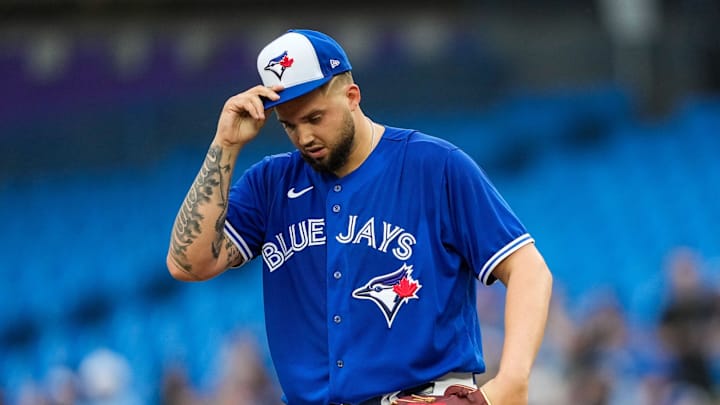Sustainable Stranding: How Alek Manoah Leaves Runners On Base

In this story:
Alek Manoah finds himself near the top of many pitching statistics this season. He's second in the American League in wins, second in quality starts, and eighth in ERA.
But there's another stat the 24-year-old righty is a frontrunner for, and it's been the key for his success this year. Manoah has left 79.9% of runners on base, a strand rate that ranks eighth in baseball, right up there with Justin Verlander and Shane McClanahan.
The league average strand rate (or LOB%) is around 73%, and players who over or underperform that number each year are often expected to progress or regress to the mean. While Manoah may seem like a regression candidate, a select few outlier pitchers regularly outperform the average LOB%, and Toronto's starter could be one of those unique aces.
The biggest factor for sustaining an above-average strand rate has always been strikeouts. Corbin Burnes posted a 75.7% or better LOB% each of the last three seasons, in large part thanks to his 12 K/9. But the strikeouts aren't a requirement, with Verlander rocking well above average LOB% throughout his career despite K/9s that have floated between 6.0 and 12.2. In 2022, Verlander ranks fifth in LOB% with an 8.87 K/9.
Manoah has a respectable strikeout rate, but the explanation behind his success with runners on isn't quite that simple. For Manoah, and any pitcher, getting out of runners-on situations requires some luck, and the righty's .245 BAbip implies there's an element of chance in his LOB success this year. But there are other factors, too.
Manoah credits his defense for making plays but also admits there's a focus level that goes up with men on base. He's said before when runners get on base he "gets angry" and the increased intensity bears out in the numbers. He's allowed a .214 batting average against overall this season and when runners get on that drops to .206. When they get into scoring position: .159.
"A little bit of good luck, a little extra focus, and some good defense," he said.
There's also a mechanical consistency that gives Manoah an on-base edge. In his sophomore season at West Virginia University, the righty was looking to simplify his delivery and find the strike zone more often. He cut the windup out, even with no one on base, and has exclusively pitched out of the stretch since. Manoah found the consistency and the strikes he was hoping for with that change and the added benefit of not having to switch his delivery when runners get on.
"Being from the stretch so much, I'm comfortable in that position," Manoah said. "So I don't have to think about mechanics, I can just think about pitching. If you have to think about mechanics, and pitching, and a runner, that's a lot of things."
The only differences for Manoah when runners get on are his speed to the plate and managing the running game. With a guy on first, Manoah varies his time to the plate, peaking over his shoulder at the runner before every pitch. He also has a few pickoff moves to keep runners honest.
Manoah has the 18th most pickoff attempts in baseball this season (including seven in one at-bat), and has two quick and slow throw-overs he uses depending on the runner. Sometimes Manoah waits for his battery mate, Alejandro Kirk, to suggest a throw over, and other times he quickly pivots and fires an attempt to first.
Alek Manoah attempts 7 consecutive pick offs of Brett Phillips: pic.twitter.com/yGOE67mN5j
— TrueRGM (@TrueRGM) May 15, 2022
While the throws haven't earned Manoah a pickoff yet this year, he's been one of the best in baseball at holding runners on. With varying pickoff moves and a quick pace home, Manoah is able to keep runners to cautious leads, he said, and cautious leads usually force with cautious base running. Only 10 runners have attempted a stolen base on the righty this season and four of them have been caught (the most on the Jays).
"I trust Kirky back there," Manoah said. "If that guy wants to go, he's going to throw him out."
There's certainly luck involved in Manoah's strand rate, but there are also countless controlled variables that the second-year starter has thought about and refined. He may see some LOB% regression this season or next year, but, like Verlander and Burnes and Robbie Ray, Manoah has the tools to be an outlier.

Mitch Bannon is a baseball reporter for Sports Illustrated covering the Toronto Blue Jays and their minor league affiliates.Twitter: @MitchBannon